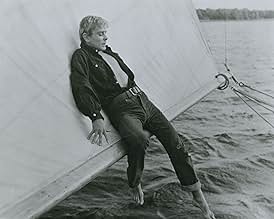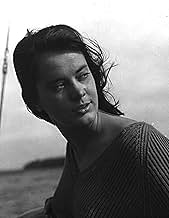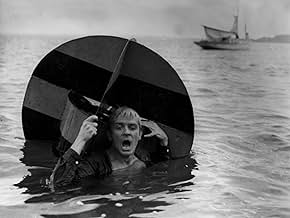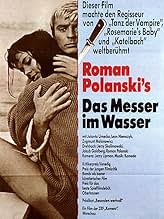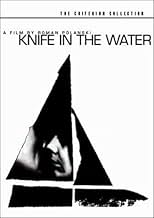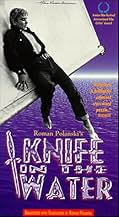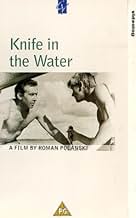CALIFICACIÓN DE IMDb
7.4/10
24 k
TU CALIFICACIÓN
Un matrimonio mayor invita a un joven autoestopista a unírseles en un viaje en barco.Un matrimonio mayor invita a un joven autoestopista a unírseles en un viaje en barco.Un matrimonio mayor invita a un joven autoestopista a unírseles en un viaje en barco.
- Dirección
- Guionistas
- Elenco
- Nominado a 1 premio Óscar
- 1 premio ganado y 2 nominaciones en total
Anna Ciepielewska
- Krystyna
- (voz)
- (sin créditos)
Roman Polanski
- Young Man
- (voz)
- (sin créditos)
Opiniones destacadas
In Polanski's feature debut, "Knife in the Water," strange power games were again to the fore, with ridiculous macho rivalries arising when a young looking man hitches a lift with a sportswriter and his attractive wife
Though the plot itself is slim, the film is distinguished by Polanski's precise visuals, which point the shifts in allegiance between the three characters through subtle groupings; impressively, although almost the whole film is situated on a small yacht, the effect is always cinematic rather than theatrical
Polanski's film is implicit, ingenious, mesmerizing, and has artistic integrity It is filled with a very different sort of suspense There is no violence The suspense is hinted at, suggested, refined tautly, glimpsed, did-he-mean-what-I-think-he-meant?
The rich man's confidence was in his possessions, among which was numbered his attractive wife, lying in bikini, teasing by arousing expectations between them on the deck The student's confidence, casual, almost unaware, was in his very being... The husband resented the youth, the strength, the "cool," the easy virility of the student and worked out a compulsion to keep challenging them, to try to show his superiority
Polanski was fair each had his own strengths and skills; but the one obsessively resented the others
Polanski's film is implicit, ingenious, mesmerizing, and has artistic integrity It is filled with a very different sort of suspense There is no violence The suspense is hinted at, suggested, refined tautly, glimpsed, did-he-mean-what-I-think-he-meant?
The rich man's confidence was in his possessions, among which was numbered his attractive wife, lying in bikini, teasing by arousing expectations between them on the deck The student's confidence, casual, almost unaware, was in his very being... The husband resented the youth, the strength, the "cool," the easy virility of the student and worked out a compulsion to keep challenging them, to try to show his superiority
Polanski was fair each had his own strengths and skills; but the one obsessively resented the others
There is nothing more thrilling than discovering a natural filmmaker for the first time. There are only so many, and you can only have menarche once. Its an introduction into another life.
I first saw this in 1965 at the Orson Welles Cinema near Harvard Square. We were told it was made behind the backs of Iron Curtain thugs, only surviving because of international attention. (I wouldn't meet Tarkovsky or Kieslowski until later.) And that it was made by the fellow who had made the striking "Repulsion," which at that time was anticipated but yet unseen in the States.
I've since learned some striking things: that both Polanski and his co-writer wanted to play the hitchhiker and indeed it is Polanski's voice. And that the mistress who seems only half alive was in fact played by a non-actress they found by looking at swimming pools. Also that the situation was suggested by a long planned and discussed Orson Welles project ("The Deep") that was started after this and never completed.
The writing is good of course, especially the central image the title denotes, but the camera finds the perfect place always. It is like Altman's camera (after this) that discovers the action rather than, say Spielberg's where the action is obviously happening in such a way to be cleanly seen by the camera. And so much harder on a boat!
But the interesting thing about such an introduction to a filmmaker is the relationship that follows: we know certain things about how he thinks and sees. We expect the conversation to continue and mature over the years. And what a rocky ride this man has taken us on, through perfectly created worlds (in which I include "Ninth Gate") but also through pure dreck and rank sentimentality (both of which tag "The Pianist").
Sometimes he's internal to the narrative, even the charmed actor. Sometimes he is outside the narrative, pulling strings (as with this film) but sometimes it is clear he never got out of bed.
As with Kubrick and so many others, you really must start at the beginning, which essentially means here.
Ted's Evaluation -- 3 of 3: Worth watching.
I first saw this in 1965 at the Orson Welles Cinema near Harvard Square. We were told it was made behind the backs of Iron Curtain thugs, only surviving because of international attention. (I wouldn't meet Tarkovsky or Kieslowski until later.) And that it was made by the fellow who had made the striking "Repulsion," which at that time was anticipated but yet unseen in the States.
I've since learned some striking things: that both Polanski and his co-writer wanted to play the hitchhiker and indeed it is Polanski's voice. And that the mistress who seems only half alive was in fact played by a non-actress they found by looking at swimming pools. Also that the situation was suggested by a long planned and discussed Orson Welles project ("The Deep") that was started after this and never completed.
The writing is good of course, especially the central image the title denotes, but the camera finds the perfect place always. It is like Altman's camera (after this) that discovers the action rather than, say Spielberg's where the action is obviously happening in such a way to be cleanly seen by the camera. And so much harder on a boat!
But the interesting thing about such an introduction to a filmmaker is the relationship that follows: we know certain things about how he thinks and sees. We expect the conversation to continue and mature over the years. And what a rocky ride this man has taken us on, through perfectly created worlds (in which I include "Ninth Gate") but also through pure dreck and rank sentimentality (both of which tag "The Pianist").
Sometimes he's internal to the narrative, even the charmed actor. Sometimes he is outside the narrative, pulling strings (as with this film) but sometimes it is clear he never got out of bed.
As with Kubrick and so many others, you really must start at the beginning, which essentially means here.
Ted's Evaluation -- 3 of 3: Worth watching.
Knife in the Water is the debut feature film from Polish director Roman Polanski. It is a very minimalist film, shot in black and white, and spoken in Polish. It isn't much by you have to start somewhere. The film is about a rich writer and his young wife. They are going sailing for the day, but on the way to the docks they pick up a hitchhiking student whom we never learn the name of. They allow the student to accompany them on their day tour of the lake, a decision they will forever regret. Tensions start to slowly boil on the boat as relationships grow more and more heated. Almost the entire film takes place on the boat and these three are the only people in the whole movie. It is the definition of minimalist filmmaking in looks, as well as content.
Knife in the Water is, for lack of a better word, dull. Not much happens and I never feel like this film is going anywhere. It is a mere 94 minutes, but the first 70 of those minutes seem to be useless and mundane. There are moments when you think it is going to pick up, but it never really does. It is a slow film that chronicles every little moment of this trip to sea and it eventually grows tiresome to just watch these characters rig up ropes, steer the boat, cook food, eat food, play games, etc. The film does start to pick up in about the last twenty minutes as events start shaking up the story so that it can come to a vague resolution. And yet the film still lacks any kind of "aha!" moment and is devoid of any real wow! factor.
The film's central focus is on the relationship between the three characters on the book so most of the action is meant to develop the characters. The development is just as slow as everything else, however. We get to know these characters very well, but in the end we sort of regret it. There isn't much to know about these people and their stories lack any sort of intrigue. When I finally started to figure out these people I was hit with a faint breeze of anticlimactic. Then things begin to pick up, slow down again, become mildly interesting, then the film ends. And then as the screen fades to black I sort of just shrugged my shoulders and walked away.
You could argue that there is a lot of subtext here with lots of things open to interpretation. The film is vague in location, time, and character background, so there is a certain amount of this film that you could interpret in all sorts of bizarre and far fetched ways. Personally, I don't see it. I realize where a lot of the deeper prying into the film comes from. People want to see a lot more in this film than what I believe is actually there. What I did feel was a certain amount of tension that was underlying the entire film in a very discreet and possibly non existent way. Again, I feel like I was expecting something more to this film than what was actually there, thus the tension and uneasiness was all fabricated in my mind. This is just a weird movie to wrap your head around, and it doesn't seem to amount to much in the end.
Knife in the Water left me expecting a lot more. It just isn't an incredibly fascinating film. It isn't a bad film, but it isn't that great and I definitely wouldn't watch it again. I like Roman Polanski a lot and so I was really interested to see his very first feature film so it was pretty disappointing to see what little his first feature amounted to. If I had seen this in 1962 I probably wouldn't have thought much of Polanski, but of course I know how renowned he is in 2011, so Knife in the Water in no way hurts my opinion of the man's work.
Knife in the Water is, for lack of a better word, dull. Not much happens and I never feel like this film is going anywhere. It is a mere 94 minutes, but the first 70 of those minutes seem to be useless and mundane. There are moments when you think it is going to pick up, but it never really does. It is a slow film that chronicles every little moment of this trip to sea and it eventually grows tiresome to just watch these characters rig up ropes, steer the boat, cook food, eat food, play games, etc. The film does start to pick up in about the last twenty minutes as events start shaking up the story so that it can come to a vague resolution. And yet the film still lacks any kind of "aha!" moment and is devoid of any real wow! factor.
The film's central focus is on the relationship between the three characters on the book so most of the action is meant to develop the characters. The development is just as slow as everything else, however. We get to know these characters very well, but in the end we sort of regret it. There isn't much to know about these people and their stories lack any sort of intrigue. When I finally started to figure out these people I was hit with a faint breeze of anticlimactic. Then things begin to pick up, slow down again, become mildly interesting, then the film ends. And then as the screen fades to black I sort of just shrugged my shoulders and walked away.
You could argue that there is a lot of subtext here with lots of things open to interpretation. The film is vague in location, time, and character background, so there is a certain amount of this film that you could interpret in all sorts of bizarre and far fetched ways. Personally, I don't see it. I realize where a lot of the deeper prying into the film comes from. People want to see a lot more in this film than what I believe is actually there. What I did feel was a certain amount of tension that was underlying the entire film in a very discreet and possibly non existent way. Again, I feel like I was expecting something more to this film than what was actually there, thus the tension and uneasiness was all fabricated in my mind. This is just a weird movie to wrap your head around, and it doesn't seem to amount to much in the end.
Knife in the Water left me expecting a lot more. It just isn't an incredibly fascinating film. It isn't a bad film, but it isn't that great and I definitely wouldn't watch it again. I like Roman Polanski a lot and so I was really interested to see his very first feature film so it was pretty disappointing to see what little his first feature amounted to. If I had seen this in 1962 I probably wouldn't have thought much of Polanski, but of course I know how renowned he is in 2011, so Knife in the Water in no way hurts my opinion of the man's work.
Polanski's first feature, on paper, sounds like nothing more than a run-of-the-mill claustrophobic thriller set on a boat - a couple takes a loner on board, you figure out the rest. 'Dead Calm', 'The Deep', etc etc etc.
Instead, 'Knife In The Water' is an agonisingly tense look at male posturing & ego, the husband & hitch-hiker constantly challenging each other in every possible way - sailing prowess, games of fiddlesticks, knife throwing & just generally strutting about. There's almost never a single moment where the two aren't trying to trump each other, & one gets the impression that it's not even to impress the girl, so much as themselves. As the film progresses, the tension mounts & tempers fray.
In a Hollywood film, this would build up to a dramatic climax of violence & catharsis, accompanied with thunder & lightning. Polanski doesn't let us off the hook that easily - things get rough, but the games continue, right until the very end of the film.
Shot in black & white, with a cast of three, & virtually one small location, 'Knife In The Water' puts bigger films to shame. No stars, no pyrotechnics, no special effects, probably very little budget, & it's completely riveting from start to finish.
It was nominated for the Best Foreign Film at the Oscars - the first feature of a young Polish film student - & rightly so.
A brilliant start to a brilliant career.
Instead, 'Knife In The Water' is an agonisingly tense look at male posturing & ego, the husband & hitch-hiker constantly challenging each other in every possible way - sailing prowess, games of fiddlesticks, knife throwing & just generally strutting about. There's almost never a single moment where the two aren't trying to trump each other, & one gets the impression that it's not even to impress the girl, so much as themselves. As the film progresses, the tension mounts & tempers fray.
In a Hollywood film, this would build up to a dramatic climax of violence & catharsis, accompanied with thunder & lightning. Polanski doesn't let us off the hook that easily - things get rough, but the games continue, right until the very end of the film.
Shot in black & white, with a cast of three, & virtually one small location, 'Knife In The Water' puts bigger films to shame. No stars, no pyrotechnics, no special effects, probably very little budget, & it's completely riveting from start to finish.
It was nominated for the Best Foreign Film at the Oscars - the first feature of a young Polish film student - & rightly so.
A brilliant start to a brilliant career.
Devastating and beautiful early film from talented director Roman Polanski...but 'beautiful' in a sad, melancholy sense. Rarely have I seen a picture which so vividly captures the wonder of weather (gray and drizzly skies and choppy sea water, illuminated suddenly by a burst of sun rays). Sure, the film is in black-and-white, however that foreboding sky actually becomes a character in the plot involving a couple out for a boating weekend who pick up a hitchhiker and invite him along on their trip. Not a whole lot of story (in the conventional sense), though both Jerzy Lipman's amazing cinematography and Krzysztof Komeda's jazzy score make the journey a worthy ride which builds in suspense and a creepy, muted kind of ambiance. Polanski's eye is unerring, but don't expect him to give into a big pay-off. The narrative is pretty much based in reality--it's grounded--and is without major outbursts, violence or melodrama. *** from ****
¿Sabías que…?
- TriviaThe first scene in the film shows Andrzej and Krystyna driving a car. As shooting from the platform in front of the car was not yet available, the crew was tied to the car, standing on its mask. To get the proper light effects, they held a blanket with a small hole for the camera. Leon Niemczyk (Andrzej) was really driving this car quite fast (this was crucial to this scene), but he couldn't see anything. He drove the car using the tops of the trees to imagine where the road is.
- ErroresWhen the young boy is trying to stabilize the Christine by hanging off its side, the railing of the camera boat can be seen in the lower left-hand corner of the screen.
- ConexionesEdited into Spisok korabley (2008)
Selecciones populares
Inicia sesión para calificar y agrega a la lista de videos para obtener recomendaciones personalizadas
- How long is Knife in the Water?Con tecnología de Alexa
Detalles
- Tiempo de ejecución1 hora 34 minutos
- Color
- Mezcla de sonido
- Relación de aspecto
- 1.37 : 1
Contribuir a esta página
Sugiere una edición o agrega el contenido que falta

Principales brechas de datos
By what name was El cuchillo en el agua (1962) officially released in India in English?
Responda
